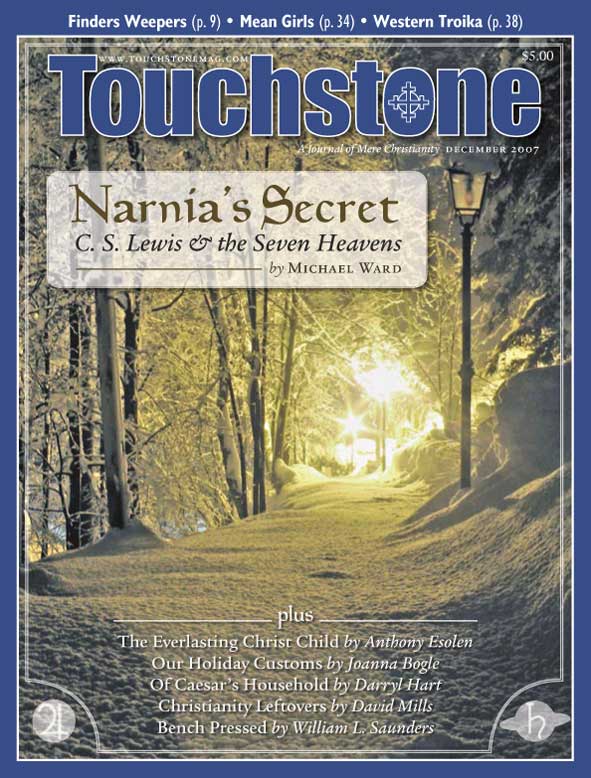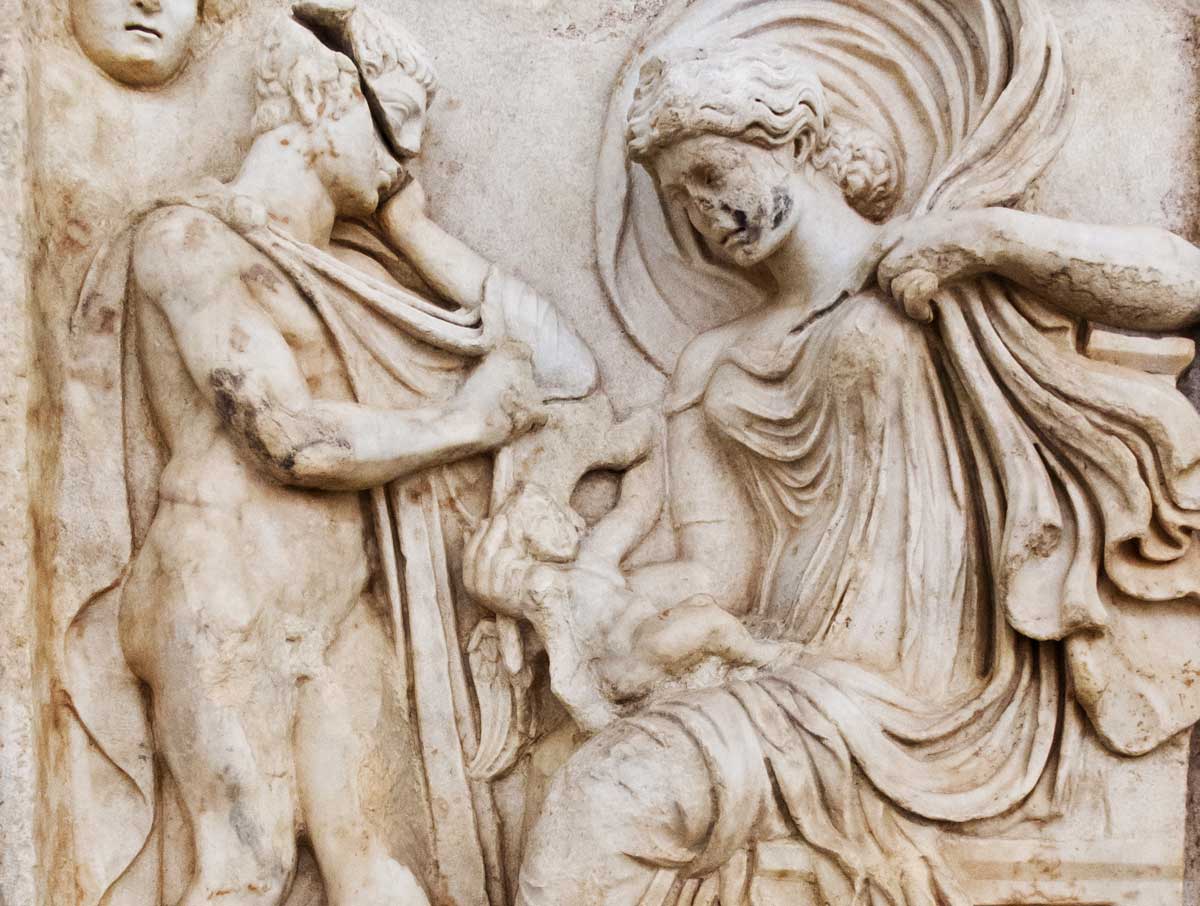Feature
Of Caesar’s Household
Multiculturalism & the Christian’s Multiple Identities
After a historical epoch dominated by mono-causal explanations of civilization, a time when Darwin, Marx, and Freud traced most human achievements to biological necessity, economic interest, or sexual repression, reductionism—the habit of tracing spiritual and artistic expressions to physical or material circumstances—no longer looks as plausible as it once did.
Contemporary believers are especially sensitive to the efforts of scholars to explain something as noble and uplifting as faith as simply the function of a basic physical urge, social conditioning, or psychological need. Students of religion who are sympathetic to faith are much more inclined to speak of belief as an independent variable that may influence human motives or cultural expressions as much as, if not more than, biological, economic, or psychological circumstances.
Of course, reductionism is not entirely vanquished. The politics of identity that has shaped many of America’s most important political debates since the legislation of the Great Society continues to nurture it. During the 1960s and 1970s the holy trinity of race, class, and sex dominated academic investigations of American society while also providing Democrats and Republicans with strategies for winning at the ballot box.
Lately, class has lost some of its use as a definer of identity, thanks to the ascendancy of sexual orientation. But the power of the politics of identity shows no signs of abating, and one significant reason is the addition of faith to the list of essential identities that cannot be explained away as the expression of some more fundamental factor.
Quite plausibly, to counter secular explanations that seek to reduce religion to material first-causes, apologists for Christianity insist that faith is as basic to human identity and motivation as class, race, sex, and sexual preference.
Liberalism’s Abstraction
The reaction of those who hold certain parts of their identity dear, believers included, is understandable as a response to modern liberalism’s demands for objective and neutral grounds for political participation. The basis for modern political participation has been an understanding of the person as abstractly human, stripped of the accidents of blood, land, or creed.
Multiculturalism was an understandable reaction against such a cookie-cutter approach to the person. Liberalism could not take (because it was expressly prohibited from taking) account of personal idiosyncracracies such as kinship, family, race, region, creed, income, sex, or sexual preference.
The recognition of liberalism’s inadequacy in handling particular aspects of personal identity came relatively late in the politics of identity. Some believers take liberalism’s disdain of faith personally, as if liberalism is inherently anti-religious. But even if applied inconsistently, liberalism’s disregard of the personal is no more hostile to faith than to race, class, sex, or sexual orientation.
Even so, the cost of political participation to religion seems excessively high to many American Christians, and this helps explain the rise of the Religious Right specifically but also the emergence of “values voters.” For them, faith is a personal experience so total that it necessarily transforms a person’s most basic dispositions and motivation, thus contradicting liberalism’s demand for a neutral or impersonal political self.
The Evangelical Protestant understanding of conversion is a particularly good example of a conception of religious identity that confounds the modern convention of distinguishing private convictions from public civic responsibilities. But Christ’s own summary of the Law, namely, to love God with all of one’s heart, soul, mind, and strength, is apparently no less rigorous a construction of the claims of faith upon the self.
The assumption is that religious citizens cannot leave their faith behind when they enter the public square. Faith demands that believers base decisions concerning matters of public justice and social order on the religious truths they profess.
The logic implicit in this assumption is that the teachings of Holy Scripture cannot be reserved to a religious sphere. Christianity teaches a host of truths about both morality and human relationships that have a direct bearing on public life. It is impossible, consequently, to hide faith “under a bushel,” as the old children’s song has it. Making room for religion in public life, then, is simply a matter of respecting personal integrity.
Postethnic Christianity
This seems to bring the relationship between Christianity and liberalism to an impasse. But we may have a way out in what the historian David A. Hollinger has called a “postethnic” perspective on personal identity.
“Most individuals live in many circles simultaneously,” he wrote in his Postethnic America: Beyond Multiculturalism, and this reality involves “a shifting division of labor between the several ‘we’s’ of which the individual is part.” For instance,
how much weight at what particular moments is assigned to the fact that one is Pennsylvania Dutch or Navajo relative to the weight assigned to the fact that one is also an American, a lawyer, a woman, a Republican, a Baptist, and a resident of Minneapolis?
Acknowledging and sorting out these multiple sources of personal identity are key to a postethnic outlook, as opposed to its rivals, the “unreconstructed universalist” of classical liberal theory and the “unreconstructed ethnocentrist” of multiculturalism. Instead of locating personal meaning in abstract conceptions of humanity or in “ostensibly primordial ties” of particular communities, Hollinger calls for constant awareness and negotiation of the particular and universal claims upon the self. In his own words, postethnicity involves “sensitivity to the potentially overlapping character of various local communities” matched with “a recognition of the reality and influence of communities global in scale.”
On the surface, a postethnic outlook would appear to be a long way from Christian conceptions of the self and the nature of religious identity. But on closer inspection, the Christian view may be more compatible with it than is commonly supposed.
Take the case of the Apostle Paul and his widely appealed to instruction on the relationship between Christian and human identities. In the epistle to the Galatians he wrote, “For as many of you as were baptized into Christ have put on Christ.” Consequently, “there is neither Jew nor Greek, there is neither slave nor free, there is neither male nor female; for you are all one in Christ” (Gal. 3:27,28).
These verses have provided Christians with a rationale for adhering to liberalism’s universalistic project of eradicating all particular identities and loyalties other than that of faith, such as eradicating the enormity of slavery, social divisions based on class, and hierarchies rooted in sex. The water of baptism apparently washes away those primordial characteristics that separate people while also unifying believers in a common faith.
The problem with a universalistic reading of this passage is that Paul offered instruction that appeared to legitimize social distinctions and ranks based precisely on race, class, and sex. For instance, if sex is no longer consequential, why did the apostle also teach husbands and wives about their respective responsibilities in marriage and child-rearing? The same could be said for political responsibilities, where Paul exhorted Christians to submit to the powers that God had ordained, whether a pagan emperor or a Christian master.
Babelian Christianity
Indeed, Paul’s refusal to immanentize the eschaton and establish a one-size-fits-all Christian identity for the early Church was compatible with the God-ordained cultural diversity that the Tower of Babel instituted.
Of course, the Church’s understanding of religion and personal identity differed from Israel’s by spiritualizing ethnicity rather than identifying a particular ethnic group with God’s anointed people. Still, the Church’s openness to different ethnic groups and its revision of Old Testament sexual patterns were not a blueprint for building another tower as the basis for a universal culture or state.
Christians did not have their own language or culture but lived with Greek, Roman, and Jewish ways. Unlike Israel, where cult and culture were seamless, the Church called Christians to live hyphenated lives with multiple identities because cult and culture were in constant -tension.
Could it be that Paul’s instruction about Christian identity is more compatible with postethnic conceptions of the self than with multicultural notions that reduce personal identity to religion? If so, the reason stems from the apostle’s implicit recognition that Christians were more than simply church members. They also belonged to families and communities, and were still involved in work and activities beyond the fellowship of the saints.
Paul himself experienced the reality of multiple identities when he ran into trouble with the political authorities. Paul was a citizen of the Roman Empire, a rarity among the apostles. This became the basis for his appeal to Rome’s jurisdiction during his trial before Jewish authorities for having profaned the Temple. It was an unusual tactic if only because it afforded the apostle a level of legal protection not available to other church officers.
And although Paul was no more successful than they in avoiding a martyr’s fate, his assertion of his rights as a Roman citizen demonstrated that he was not simply thinking of himself as a member of the Church but also as a person with other parts to his identity. His religious identity was not so complete that it prevented the apostle from recognizing, and asserting, his civic identity.
A Hyphenated Israelite
What was true of Paul also turns out to be true of certain Old Testament believers. The typical Israelite did not distinguish between his religious and political identities, because the point of Israel, at least in part, was to be a holy nation, a theocracy that might possess a separation of powers (i.e., among prophets, priests, and king) but was not a civil realm independent of religious norms.
But when the Israelites went into exile, they faced a situation not unlike that of the first Christians, where cult and culture were not in harmony but profoundly at odds. One important figure who faced this predicament was the prophet Daniel.
Despite his fame for devoted courage shown in the lions’ den, Daniel lived much more of a hyphenated identity than his legendary narrative suggests. Here was a devout man who excelled in learning the language, literature, and wisdom of the Chaldeans to such an extent that he emerged as the wisest of the pagan realm’s counselors.
This learning involved a language and literature infused with ideas and beliefs that from the perspective of Israelite orthodoxy were downright idolatrous. Even so, Daniel excelled at this learning. He was the model exiled believer who assimilated the ways, culture, and customs of a nation that had not only defeated his own beloved homeland but was also at enmity with his God. Although far removed from his sacred land and liturgy, Daniel added a new cultural identity to his religious one and excelled at both.
Of course, he drew the line when it came to worship. He refused to eat the rich food and drink the exceptional wine of the king’s court, because the food and wine had been used as part of the worship rites of the Chaldean gods. He also defied state laws that forbade prayers to any foreign god, and he continued with his own daily rituals of prayer. This act of defiance landed him in a den with hungry lions.
Consequently, his submersion in an alien culture was not complete. He retained his Jewish religious identity. But culturally and politically, Daniel was sufficiently Chaldean to merit fame and ultimately political power.
Daniel, the assimilated and devout prophet, may be the best argument against religious reductionism. The point is not simply that because reductionism is simplistic, a religious version will likely make the same mistake. The problem with Christian reductionism is that it misses the hyphenated character of Christian devotion.
Double Identity
When the Apostle Peter called the first Christians aliens and strangers, he was observing the doubleness that characterizes faith on this side of the new heaven and new earth. Christians are called to juggle loyalties to the rulers of two cities, one spiritual and eternal, the other physical and temporal. In addition, they have competing responsibilities that come from being members of families, neighborhoods, guilds, and states.
To reduce Christian identity to faith is to neglect the multiplicity of identities that follow from being part of the order God established through creation and providence, as well as the one being instituted redemptively through the new creation. In the eschaton, the self will finally be completely integrated and religious identity will be total.
At that time, religious reductionism may finally be legitimate. Until then, it misses the complexity of God’s reign and purposes in between the advents of Christ. •
D. G. Hart works for the Intercollegiate Studies Institute (www.isi.org) and is an elder in the Orthodox Presbyterian Church. He is the author of A Studen't Guide to Religious Studies (ISI Books) and John Williamson Nevin: High Church Calvinist (P&R Books).
subscription options
Order
Print/Online Subscription

Get six issues (one year) of Touchstone PLUS full online access including pdf downloads for only $39.95. That's only $3.34 per month!
Order
Online Only
Subscription

Get a one-year full-access subscription to the Touchstone online archives for only $19.95. That's only $1.66 per month!
bulk subscriptions
Order Touchstone subscriptions in bulk and save $10 per sub! Each subscription includes 6 issues of Touchstone plus full online access to touchstonemag.com—including archives, videos, and pdf downloads of recent issues for only $29.95 each! Great for churches or study groups.
Transactions will be processed on a secure server.
more from the online archives
calling all readers
Please Donate
"There are magazines worth reading but few worth saving . . . Touchstone is just such a magazine."
—Alice von Hildebrand
"Here we do not concede one square millimeter of territory to falsehood, folly, contemporary sentimentality, or fashion. We speak the truth, and let God be our judge. . . . Touchstone is the one committedly Christian conservative journal."
—Anthony Esolen, Touchstone senior editor









